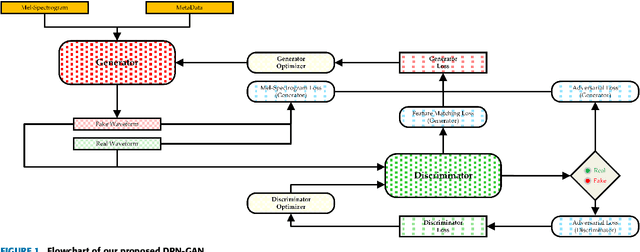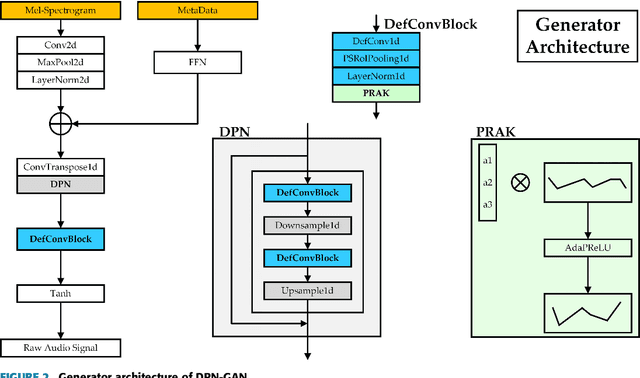Shudi Bao
DPN-GAN: Inducing Periodic Activations in Generative Adversarial Networks for High-Fidelity Audio Synthesis
May 14, 2025



Abstract:In recent years, generative adversarial networks (GANs) have made significant progress in generating audio sequences. However, these models typically rely on bandwidth-limited mel-spectrograms, which constrain the resolution of generated audio sequences, and lead to mode collapse during conditional generation. To address this issue, we propose Deformable Periodic Network based GAN (DPN-GAN), a novel GAN architecture that incorporates a kernel-based periodic ReLU activation function to induce periodic bias in audio generation. This innovative approach enhances the model's ability to capture and reproduce intricate audio patterns. In particular, our proposed model features a DPN module for multi-resolution generation utilizing deformable convolution operations, allowing for adaptive receptive fields that improve the quality and fidelity of the synthetic audio. Additionally, we enhance the discriminator network using deformable convolution to better distinguish between real and generated samples, further refining the audio quality. We trained two versions of the model: DPN-GAN small (38.67M parameters) and DPN-GAN large (124M parameters). For evaluation, we use five different datasets, covering both speech synthesis and music generation tasks, to demonstrate the efficiency of the DPN-GAN. The experimental results demonstrate that DPN-GAN delivers superior performance on both out-of-distribution and noisy data, showcasing its robustness and adaptability. Trained across various datasets, DPN-GAN outperforms state-of-the-art GAN architectures on standard evaluation metrics, and exhibits increased robustness in synthesized audio.
A Simple and Efficient RSS-AOA Based Localization with Heterogeneous Anchor Nodes
Jul 22, 2023



Abstract:Accurate and reliable localization is crucial for various wireless communication applications. Numerous studies have proposed accurate localization methods using hybrid received signal strength (RSS) and angle of arrival (AOA) measurements. However, these studies typically assume identical measurement noise distributions for different anchor nodes, which may not accurately reflect real-world scenarios with varying noise distributions. In this paper, we propose a simple and efficient localization method based on hybrid RSS-AOA measurements that accounts for the varying measurement noises of different nodes. We derive a closed-form estimator for the target location based on the linear weighted least squares (LWLS) algorithm, with each LWLS equation weight being the inverse of its residual variance. Due to the unknown variances of LWLS equation residuals, we employ a two-stage LWLS method for estimation. The proposed method is computationally efficient, adaptable to different types of wireless communication systems and environments, and provides more accurate and reliable localization results compared to existing RSS-AOA localization techniques. Additionally, we derive the Cramer-Rao Lower Bound (CRLB) for the RSS-AOA signal sequences used in the proposed method. Simulation results demonstrate the superiority of the proposed method.
Accurate RSS-Based Localization Using an Opposition-Based Learning Simulated Annealing Algorithm
Jul 22, 2023Abstract:Wireless sensor networks require accurate target localization, often achieved through received signal strength (RSS) localization estimation based on maximum likelihood (ML). However, ML-based algorithms can suffer from issues such as low diversity, slow convergence, and local optima, which can significantly affect localization performance. In this paper, we propose a novel localization algorithm that combines opposition-based learning (OBL) and simulated annealing algorithm (SAA) to address these challenges. The algorithm begins by generating an initial solution randomly, which serves as the starting point for the SAA. Subsequently, OBL is employed to generate an opposing initial solution, effectively providing an alternative initial solution. The SAA is then executed independently on both the original and opposing initial solutions, optimizing each towards a potential optimal solution. The final solution is selected as the more effective of the two outcomes from the SAA, thereby reducing the likelihood of the algorithm becoming trapped in local optima. Simulation results indicate that the proposed algorithm consistently outperforms existing algorithms in terms of localization accuracy, demonstrating the effectiveness of our approach.
 Add to Chrome
Add to Chrome Add to Firefox
Add to Firefox Add to Edge
Add to Edge